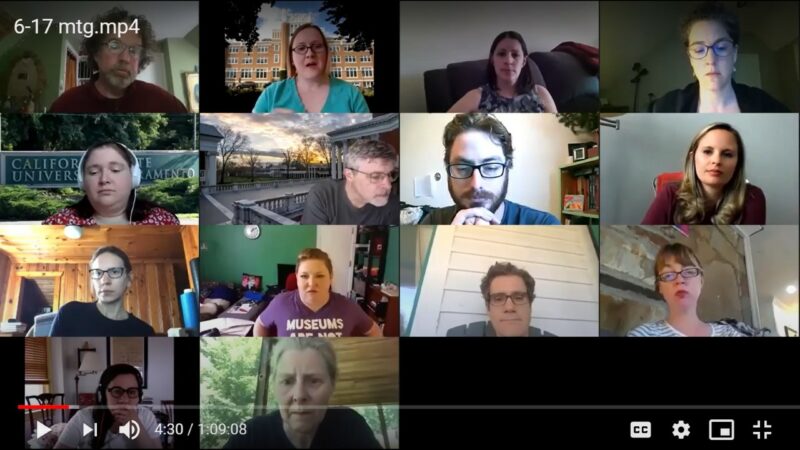Teaching Public History Online: A Report From This Summer’s Working Group
02 October 2020 – Jennifer Black, Abigail Gautreau, William Stoutamire and Katie Stringer Clary
Editors’ Note: This post from the facilitators of the NCPH Teaching Public History Online Working Group summarizes the group’s efforts to develop best practices and lesson plans for teaching public history online during the COVID-19 pandemic. For more information on the working group and the materials they developed, go here.
When the COVID-19 pandemic forced the shutdown of colleges and universities nationwide this past spring, many public history educators suddenly found themselves teaching their courses online for the first time. As it became increasingly clear that the pandemic would continue into the summer and fall, discussions on the PH-Educators listserv and NCPH Members Forum on Facebook led NCPH to issue a call for participants interested in forming a working group on teaching public history online. Twenty-seven public historians expressed interest, with four agreeing to facilitate the conversation. In anticipation of an unprecedented fall semester, this working group met regularly throughout the summer to gather resources, develop best practice documents, and write lesson plans. We found these conversations to be both invigorating and encouraging, and we are pleased to make those resources available to everyone now.
An important prefatory note: the documents we created are not a guide to starting an online public history program; nor are they a substitute for completing dedicated training for online teaching. We strongly encourage anyone faced with teaching online or hybrid courses for the first time to take advantage of appropriate training sessions offered by their home institutions. Instead, these resources represent the start of a conversation about what quality public history pedagogy can do in the online environment. In the spirit of collaboration and support that has long characterized NCPH and its membership, we encourage anyone teaching public history this fall to look through the materials we’ve collected and borrow and/or adapt whatever they’d like.
Our work this summer unfolded in two stages. In the first half of the summer, the working group focused on resources related to distance learning. Participants took part in synchronous brainstorming sessions via Zoom and shared ideas asynchronously in Slack. The three breakout groups in this stage developed guidelines for best practices in teaching online courses in general, teaching online public history courses, and supervising virtual internships. Participants shared information from their own universities or repositories and identified digital tools and resources that could be useful. The resulting materials we compiled included guidelines for accessibility, course organization, and internship placement and oversight, as well as a list of open-access digital tools, apps, collections, and training sessions on pedagogy and related topics. Readers interested in learning more about these materials should visit our Working Group website.

A screenshot from the working group’s June 17, 2020 Zoom meeting.
During the second stage, participants developed and shared lesson plans, project guidelines, and syllabi to create a repository of assignments and projects. The six breakout groups during this stage addressed the following topic: Introduction to Public History (Undergraduate), Introduction to Public History (Graduate), Archives, Oral History, Museum Studies, and Historic Preservation. As a collection, the assignments and syllabi present options for synchronous or asynchronous work, and both short-term and semester-long lessons and projects. We encourage educators to browse through all of the topical areas when considering projects and lessons for an Introduction to Public History course.
Perhaps the most significant outcome for participants was a shift in perspective. Rather than focusing on what we could no longer do in the classroom, we began to embrace the possibilities and opportunities that teaching online could bring. We hope that these resources will encourage a similar shift in perspective among the public history educators who make use of them. The vast collection of resources we’ve gathered represents only a snippet of the materials, apps, videos, and other educational content available for public historians to utilize in the classroom. Public historians can make use of digital tools and software that digital humanities scholars have pioneered, and we encourage readers to explore the vast options available in that field. Moreover, virtual internships have the potential to bring students from smaller and rural institutions into practice with a broader network of public historians across the country. With the widespread adoption of virtual conferencing platforms such as Zoom and Google Meet we can expand our students’ understandings of the practice of public history by incorporating virtual site visits, tours, and conversations with professionals at a wider range of institutions and historical sites.
As the fall semester begins, we want to emphasize that this is just the start of a much bigger conversation that we hope will continue into the future. Some participants decided to continue meeting throughout the fall to offer mutual support and brainstorm for spring classes. Others expressed an interest in generating guidelines to help public historians on the tenure track effectively describe the process of shifting to remote instruction and quantify the work involved in recreating quality professional experiences for our students in the virtual realm. A sub-group will meet to discuss these concerns further this fall. Finally, we invite the members of the broader NCPH community to contribute to these resources. We would love to see your syllabi and your ideas for transitioning that fabulous analog assignment into the virtual realm! If you have ideas or materials you’d like to share, please contact Abby Gautreau or Jen Black about having those added to the site. We hope that this repository will evolve and expand as we continue growing as educators in a global pandemic.
~ Jennifer M. Black, Mary Kate Clary, Abigail Gautreau, and Will Stoutamire are members of the NCPH Teaching Public History Online Working Group.



